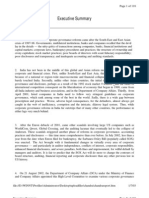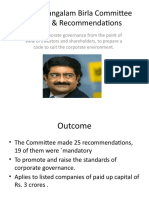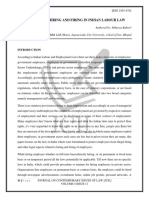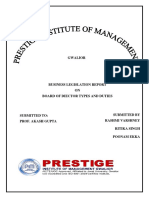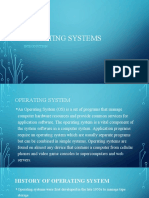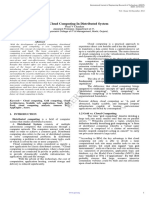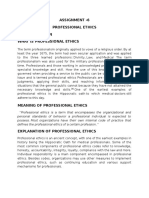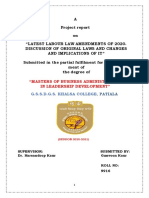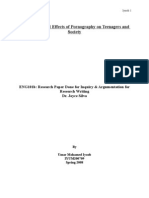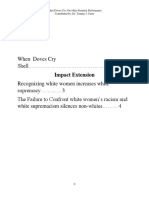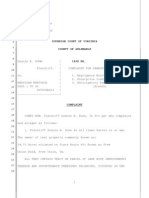Role of Auditor in Corporate Governance
Role of Auditor in Corporate Governance
Uploaded by
Prashant Singh RajputCopyright:
Available Formats
Role of Auditor in Corporate Governance
Role of Auditor in Corporate Governance
Uploaded by
Prashant Singh RajputCopyright
Available Formats
Share this document
Did you find this document useful?
Is this content inappropriate?
Copyright:
Available Formats
Role of Auditor in Corporate Governance
Role of Auditor in Corporate Governance
Uploaded by
Prashant Singh RajputCopyright:
Available Formats
ROLE OF AUDITORS IN CORPORATE GOVERNANCE:
GOVERNANCE: The term governance refers to the functions of a government evidenced by 'ruling', 'directing', 'controlling', 'exercising of authority', and the like. These include a wide range of functions performed by the executive, judiciary, and legislative realms of a country, which work as a continuum. Hence, precisely speaking, good governance describes the successful performance of a government in carrying out its governing responsibilities. However, the expression 'successful performance' has no fixed meanings. It is something relative to the situation that may vary from country to country, and even in the same country, from time to time. Moreover, any performance may have more than one rating. What one government claims to be 'good' may be condemned and even undone by the other that follows. Freezing of foreign currency accounts by Nawaz Sharif Government is an example near at hand. Again, what is 'good' according to the government is normally 'otherwise' from the opposition's point of view. In the 55 years' history of Pakistan, there were not more than two occasions when our law makers had consensus of opinion in the Assembly: one, when their perks were being revised upwards; and, two, when the levy of tax on agriculture income was being debated. Nevertheless, certain characteristics have been assigned to good governance by social scientists, which, inter alia, include: >Safety and security. >Participation with accountability. >Transparency and openness. >Justice and the rule of law. >Simple and easily understandable rules of business
GOVERNANCE IN CORPORATE SECTOR A JOURNEY IN RETROSPECT: The concept of governance,
particularly in a business organization, had died out by the end of the 18th century with the emergence of management as a systematic body of knowledge, an after effect of Industrial Revolution. Then onwards, terms like 'directing', 'controlling', 'administering' were substituted by 'leading', 'coordinating', and 'managing'. Gradually, the culture of giving orders and chasing men gave way to creating and maintaining of a work situation that was conducive to work. This obviously did not simply mean providing of physical setting for the work, or developing good working methods. It was rather primarily concerned with providing the motivational climate. Thus, manager's task was destined to be the serving of the cause of the work through the people prompted by him to get that work done, instead of lashing at a reluctant work force to drag the workload to a distasteful destination. In this context, the abbreviations like IBA or MBA seem to be a misnomer. How on earth the institutions which claim to be management-oriented, and the degree that is said to be an emblem of proficiency in management, can justify the patch of 'administration' in their nomenclature? Nonetheless, the foregone concept of 'administration' .is prepping to stage a comeback under the garb of 'governance'. It is tantamount to moving the wheel in reverse. The purpose underlying this somersault seems to be to gradually regain the autocratic style of exercising the authority once lost under the philosophies of participative management, or, scientific management, or, management by objective. At this stage, it was considered desirable to precisely define what good governance is in the context of corporate sector. In Pakistan, this gap was filled by the SECP (Securities and Exchange Commission of Pakistan). The Commission envisaged
a code of conduct for the corporate sector, especially the listed companies, for the purpose of "establishing a framework of good corporate governance". The nucleus of this code was reproduced by Mr. Khalid A Mirza, Chairman, SECP, in his presidential address at the workshop organized in Lahore on 2nd May 2002. He reiterated that there are four essential components of good corporate governance, namely: (i) sound value structure and high moral standards; (ii) basic framework of laws and regulations; (iii) judicial system / enforcement mechanism; and (iv) separation of ownership from management. "With the exception of legal framework", he added, "None of the above fundamentals was noticeable in Pakistan's corporate sector." While keeping the text of the code aside for a while, one would like to ask the SECP's Chief about the affairs of public sector corporations apropos the essentials of good governance envisaged by him. Taking the last item first, he is requested to kindly enlighten the nation as to why the chairman (chairperson in case of the First Women Bank) and the president in each nationalized commercial bank is one and the same person? Where goes the dogma of separation of ownership and management in these cases? The chairman as head of the board of directors gives policy which is implemented by the management headed by the president. The president then reports compliance to the chairman who evaluates the performance of the team led by the president. Can there be any thing more ridiculous than a situation in which a person frames the policy, passes it on to himself for implementation, himself implements it, then reports the compliance to him, and finally, himself evaluates his own performance?
Let us now examine what audit functions are, and how can they be reconciled with the needs of good corporate governance described in the foregoing paragraphs?
AUDITING ROLE OF AUDITORS IN GOOD GOVERNANCE: Auditing is defined as obtaining and
evaluating evidences regarding assertions about economic actions and events to ascertain the extent to which they correspond with the established criteria, and to communicating the result to the interested users. Thus, it encompasses investigation process, attestation process, and the reporting process, pertaining to economic actions and events. International Audit Standards maintain that an auditor's mandate may require him to take cognizance and report matters that come to his knowledge in performing his audit duties which relate to: >Compliance with legislative or regulatory requirements; >Adequacy of accounting and control systems; >Viability of economic activities, programmes, and projects. Two variant situations emerge when the functions of auditors and the requirements of good governance are placed face to face. The former is confined to 'economic actions and events, while the later is the outcome of a wide range of managerial functions. The question then arises whether the auditors should cross their operational limits in order to bring about the desired level of improvement in the quality of governance, or, alternatively, while restricting themselves to their term of reference, they should operate more effectively so as to help improve the quality of governance. Lately, a view has emerged that auditors should play a more vital and direct role in establishing good governance. Should this mean to expect them to cross the established borders of genuine audit functions, it would be stretching the string too far, without gaining
anything positive and substantial. The only alternative then is to make the auditors feel more conscientious, more dutiful, and therefore to be more effective, while restricting themselves to their term of reference. International Auditing Standards (IAS) also recognize that the matters that may be relevant to the governance of any business entity may be broader than those that form the subject matter of IAS, which are directly related to the audit of financial statements. IAS 260 categorically requires the auditors to communicate with the officials charged with the governance of an entity the matters arising from the audit of financial statements. They will not be required, the IAS continues, "to design procedure for the specific purpose of identifying matters of governance interest". Even the Code of Good Corporate Governance envisaged by the SECP subscribes to this phenomenon. Rather, it prohibits in explicit terms any such excesses on the part of the auditors. Paragraph xl under the heading 'External Auditors' reads: "No listed company shall appoint its auditors to provide services in addition to audit except in accordance with the regulations and shall require the auditors to observe applicable IFAC (International Federation of Accountants) guidelines in this regard and shall ensure that the auditors do not perform management functions or make management decisions, responsibility for which remains with the Board of directors and management of the listed company. Thus, it is established that auditors are not required to traverse their area of operation. Whatever they are expected to contribute towards good governance shall, therefore, be from within their range or sphere of activity. In other words, it is the quality of their performance that will make all the difference, which, therefore, needs to be ameliorated to match the requisites of good governance.
Once it is settled that it is the quality of audit that is aimed at, the question arises what is the desirable quality, and how can it be measured? The question has gained great momentum in recent years when considerable attention has been focused on the auditor's responsibility for negligence. This is largely the result of wide publicity being given world over to considerable sums sought by plaintiffs in compensation for losses they have suffered; losses which, they believe could have been prevented had the auditors been more vigilant. To quote a lively example, m/s Price water House, auditors of BCCI, remained in the news for quite some time during the last decade of the preceding century for their reportedly inapt behavior leading to the collapse of the Bank. An answer to this very pertinent question can be traced back in what Denning LJ observed in Candler v. Crane Christmas & Co. (1951), whose opinion was later upheld in famous Hedley Byrne case [Hedley Byrne & Co. v. Heller and Partners Ltd. (1963)], and which reads. Their [the auditors'] duty is not merely a duty to use care in their reports. They have also duty to use care in their work which results in their reports". The 'care' again is a relative term. The degree of care required may also vary from situation to situation. However, the overriding requirement is to have a "true and fair view". Interestingly enough, what is 'true and fair' is not necessarily the 'truth'. The famous Elephant Story will help explain this riddle. Three blind men were led to an elephant and asked to state by touching it what it was. The first who touched the animal from the side and felt hard and broad span of the skin said it was a wall. The other who groped around the tail announced that it was a rope. The third gentleman who came in contact with the trunk claimed that it was a hose-pipe. All the three, to the best of their knowledge, were 'true and fair' but none of them was right. This leads to the conclusion that the perception and belief a person
may have, and the opinion that he forms, about a set of circumstances depend upon: (i) his view point, and (ii) the information made available to him. This becomes all the more important in view of the fact that the law has not defined the expression 'true and fair'. Moreover, the whole process of auditing requires much imagination and careful thought from beginning to end. It is highly demanding and is often described as a very onerous responsibility. No doubt the vast majority of the profession does behave with integrity but auditors can and do sometimes fail to exercise their duty to as high a standard as is expected of them.
You might also like
- Bdi II ManualDocument3 pagesBdi II ManualFrances Araga83% (6)
- Poetry of Judith WrightDocument13 pagesPoetry of Judith WrightPaula JSNo ratings yet
- Win Win, Win Lose, and Lose LoseDocument1 pageWin Win, Win Lose, and Lose LosesteadyfalconNo ratings yet
- What Is The Role of The Monarchy in Modern BritainDocument11 pagesWhat Is The Role of The Monarchy in Modern BritainIoana MuresanNo ratings yet
- Naresh Chandra Committee ReportDocument118 pagesNaresh Chandra Committee Reportrahul_singh1288544360% (1)
- Nishithdesai Prevention of Corruption Act 2018 AmendmentsDocument5 pagesNishithdesai Prevention of Corruption Act 2018 Amendmentsqubrex1No ratings yet
- Enron Case Corporate GovernanceDocument3 pagesEnron Case Corporate GovernancesnehagptNo ratings yet
- Audit Term Paper - Case Study of Enron & WorldComDocument14 pagesAudit Term Paper - Case Study of Enron & WorldComGodfrey RichardNo ratings yet
- Business CommunicationDocument15 pagesBusiness CommunicationBibin FrancisNo ratings yet
- Corporate Governance in India - Past, Present & Future by Sonali Soni: Top Prize Winning Article - IDocument10 pagesCorporate Governance in India - Past, Present & Future by Sonali Soni: Top Prize Winning Article - IarmaanNo ratings yet
- Protection of Multimedia Works Under: Research SynopsisDocument7 pagesProtection of Multimedia Works Under: Research SynopsisAvtar singhNo ratings yet
- Lawrbit Industrial Relations Code 2020Document5 pagesLawrbit Industrial Relations Code 2020Sachin VermaNo ratings yet
- Meetings of A CompanyDocument36 pagesMeetings of A CompanyMonica BBANo ratings yet
- Independent Directors, NUALSDocument3 pagesIndependent Directors, NUALSKrishnadas SaijuNo ratings yet
- Companies Act MeetingsDocument8 pagesCompanies Act Meetingssaku_25884No ratings yet
- Kumar Mangalam Birla Committee Report & RecommendationsDocument7 pagesKumar Mangalam Birla Committee Report & RecommendationsksonaliNo ratings yet
- Careful! Woman On BoardDocument17 pagesCareful! Woman On BoardVaishali RathiNo ratings yet
- Session 4 The Corporation & Corporate GovernanceDocument44 pagesSession 4 The Corporation & Corporate GovernanceTushar VatsNo ratings yet
- Judicial Activism and Juducial Restraint (Legal Language)Document26 pagesJudicial Activism and Juducial Restraint (Legal Language)Aishani ChakrabortyNo ratings yet
- FD Collective Bargaining in IndiaDocument58 pagesFD Collective Bargaining in IndiaSHUBHAM RAJNo ratings yet
- Doctrine of Hiring and Firing in Indian Labour Law Abhavya Rabra 4Document18 pagesDoctrine of Hiring and Firing in Indian Labour Law Abhavya Rabra 4Rajeev shuklaNo ratings yet
- Procedure For Removal of Director Under Companies ActDocument132 pagesProcedure For Removal of Director Under Companies ActPrashant MeenaNo ratings yet
- Emotional IntelligenceDocument25 pagesEmotional IntelligenceKhushi DaveNo ratings yet
- Banking Sector: Developments, Challenges and OpportunitiesDocument8 pagesBanking Sector: Developments, Challenges and OpportunitiesAdeel AmeerNo ratings yet
- 2nd Internal - Final AssignmentDocument19 pages2nd Internal - Final AssignmentShaurya AronNo ratings yet
- Steps For Formation of A CompanyDocument22 pagesSteps For Formation of A Companyrajiv gupta40783% (6)
- Companies Act, 2013 NotesDocument53 pagesCompanies Act, 2013 NotesJagmohan SainiNo ratings yet
- Background: Censorship in The MediaDocument26 pagesBackground: Censorship in The MediaManDeepWarwalNo ratings yet
- Hardware and SoftwareDocument7 pagesHardware and SoftwareShea BansalNo ratings yet
- 1742, Corporate Law-I FDDocument19 pages1742, Corporate Law-I FDMukul Singh RathoreNo ratings yet
- Reserve Bank of India: An Analysis of Banking Vis A Vis GlobalizationDocument11 pagesReserve Bank of India: An Analysis of Banking Vis A Vis Globalizationarko banerjeeNo ratings yet
- Gwalior: (MBA I Semester)Document12 pagesGwalior: (MBA I Semester)Rashmi100% (1)
- Corporate Governance FinalDocument63 pagesCorporate Governance Finalrampunjani100% (1)
- Operating SystemDocument16 pagesOperating SystemMind ControlNo ratings yet
- Mediation: - : Mediation / Conciliation & Other Forms of AdrDocument23 pagesMediation: - : Mediation / Conciliation & Other Forms of AdrPrakshi AggarwalNo ratings yet
- Penology N VictimilogyDocument8 pagesPenology N Victimilogypooja malikNo ratings yet
- Financial Instruments Noor 2Document14 pagesFinancial Instruments Noor 2NoorULAinNo ratings yet
- Cloud Computing in Distributed System IJERTV1IS10199Document8 pagesCloud Computing in Distributed System IJERTV1IS10199Nebula OriomNo ratings yet
- National Law Institute University Bhopal: Project - Administrative Law SebiDocument20 pagesNational Law Institute University Bhopal: Project - Administrative Law SebiSurbhi LaddhaNo ratings yet
- Hidayatullah National Law University: Project Report OnDocument20 pagesHidayatullah National Law University: Project Report Onekta chnadrakarNo ratings yet
- Indian Laws About Broadcasting IndustryDocument6 pagesIndian Laws About Broadcasting IndustryHarshit duaNo ratings yet
- International Trade and Finance (Derivatives)Document52 pagesInternational Trade and Finance (Derivatives)NikhilChainani100% (1)
- Principles of LendingDocument2 pagesPrinciples of LendingWaqas TariqNo ratings yet
- 15 Bba 024Document3 pages15 Bba 024hardikgosaiNo ratings yet
- The Kumarmangalam Birla Committee On Corporate GovernanceDocument10 pagesThe Kumarmangalam Birla Committee On Corporate GovernanceKirti GunturiNo ratings yet
- Workers Participation in Management in IDocument19 pagesWorkers Participation in Management in IAdd KNo ratings yet
- Business Law and Ethics Notice PDFDocument146 pagesBusiness Law and Ethics Notice PDFMaster KihimbwaNo ratings yet
- Ipr Project 6th SemDocument22 pagesIpr Project 6th SemkomalNo ratings yet
- Place of Effective ManagementDocument34 pagesPlace of Effective ManagementRIcky Chopra International CounselsNo ratings yet
- Human Rights and Domestic WorkersDocument20 pagesHuman Rights and Domestic WorkersKamal ChandNo ratings yet
- Corporate Law: After Satyam-How A Scandal Changed Corporate Governance Law in IndiaDocument11 pagesCorporate Law: After Satyam-How A Scandal Changed Corporate Governance Law in Indiaankur mukherjeeNo ratings yet
- Corporate Governance ProjectDocument11 pagesCorporate Governance ProjectSathvik Reddy100% (1)
- Exceptions To Doctrince of Indoor MGT, Prospectus, Etc.Document3 pagesExceptions To Doctrince of Indoor MGT, Prospectus, Etc.Maduka CollinsNo ratings yet
- Industrial RelationDocument26 pagesIndustrial RelationGunveen AbrolNo ratings yet
- Banking - Project CompleteDocument22 pagesBanking - Project CompleteRahul SharmaNo ratings yet
- 10 Chapter 3.outputDocument33 pages10 Chapter 3.outputajith kumarNo ratings yet
- Juvenile Justice System in IndiaDocument7 pagesJuvenile Justice System in IndiaMike WalterNo ratings yet
- Evolution of Company LawDocument21 pagesEvolution of Company LawPintu Rao100% (1)
- Social Security Agreementsfdsmsfngmfnsfv G FM VXC VV XCVXVN FNG, FBG, FG, Nxcv,,xcvbnxcvbsfgjsflkagksbgnfgm, Asn FM, NdsaggmfdgDocument12 pagesSocial Security Agreementsfdsmsfngmfnsfv G FM VXC VV XCVXVN FNG, FBG, FG, Nxcv,,xcvbnxcvbsfgjsflkagksbgnfgm, Asn FM, NdsaggmfdgVishal VnNo ratings yet
- The Concept of Human RightsDocument4 pagesThe Concept of Human RightsSelinaMeurossNo ratings yet
- LLM LLP Limited Liability PDFDocument32 pagesLLM LLP Limited Liability PDFBenazir InamdarNo ratings yet
- Project On Corporate GovernanceDocument21 pagesProject On Corporate GovernanceSamriddhi RakhechaNo ratings yet
- Investigation into the Adherence to Corporate Governance in Zimbabwe’s SME SectorFrom EverandInvestigation into the Adherence to Corporate Governance in Zimbabwe’s SME SectorNo ratings yet
- Corporate Governance in InsuranceDocument95 pagesCorporate Governance in Insurancemohyeb50% (4)
- Accreditation of Barangay Based NGOsDocument26 pagesAccreditation of Barangay Based NGOsVinvin Esoen89% (9)
- The Detrimental Effect of Pornography On Teenagers and SocietyDocument25 pagesThe Detrimental Effect of Pornography On Teenagers and SocietyUmar Iyoob100% (16)
- Diamond - Eating Meat and Eating PeopleDocument9 pagesDiamond - Eating Meat and Eating PeoplessNo ratings yet
- Intro To Philo - Lesson 2Document1 pageIntro To Philo - Lesson 2Iyana GomezNo ratings yet
- MORALITYDocument156 pagesMORALITYКэндис ЛотброкNo ratings yet
- Out in The Name of Jesus - A L GillDocument69 pagesOut in The Name of Jesus - A L GillCharly Faithgueroa100% (1)
- Imprisonment For Debt: Sura Vs MartinDocument3 pagesImprisonment For Debt: Sura Vs Martingem_mataNo ratings yet
- CULTURE 11 Q3 M2 - The Concept of SocietyDocument8 pagesCULTURE 11 Q3 M2 - The Concept of SocietyHENJEL PERALESNo ratings yet
- The Power To Live A New Life by Gloria CopelandDocument25 pagesThe Power To Live A New Life by Gloria CopelandStaci Rieman100% (1)
- Policy Guideliness For Community Radio in KenyaDocument36 pagesPolicy Guideliness For Community Radio in KenyaAmos Ochieng100% (1)
- Quiros - Position PaperDocument11 pagesQuiros - Position PaperLaurene Ashley Sore-YokeNo ratings yet
- Volunteer PassportDocument16 pagesVolunteer PassportPaul RossNo ratings yet
- Work Immersion ProgramDocument10 pagesWork Immersion ProgramMarman Fabro Anga-AnganNo ratings yet
- The DecameronDocument54 pagesThe DecameronKyle CamayaNo ratings yet
- When Doves Cry Shell .1-2: Impact ExtensionDocument5 pagesWhen Doves Cry Shell .1-2: Impact ExtensionMetelitswagNo ratings yet
- Food, Civil Suppllies & Consumer Affairs Department: 1. Vacancy and Pay ScaleDocument18 pagesFood, Civil Suppllies & Consumer Affairs Department: 1. Vacancy and Pay ScaleSweet PatelNo ratings yet
- Superior Court of Virginia County of AblemarleDocument10 pagesSuperior Court of Virginia County of AblemarleRobert WatkinsNo ratings yet
- 2008-2016 Persons Bar Q and ADocument75 pages2008-2016 Persons Bar Q and AAw Lapuz100% (2)
- Interpretation, Vol 12-2-3Document276 pagesInterpretation, Vol 12-2-3platonkaihoagathonNo ratings yet
- 07a 200logDocument1 page07a 200logmalik jahanNo ratings yet
- DUZS IAB 001r4 10 Rules Implementation IIW GuidelinesDocument50 pagesDUZS IAB 001r4 10 Rules Implementation IIW GuidelinesmilovanmNo ratings yet
- Yds Sinonimler KelimelerDocument6 pagesYds Sinonimler KelimelerMahir HamdiyevNo ratings yet
- Preservation of Danish Citizenship3aDocument5 pagesPreservation of Danish Citizenship3agregNo ratings yet
- Planning and Decision Making in Public Management PDFDocument34 pagesPlanning and Decision Making in Public Management PDFjdiazvelezNo ratings yet
- CM1Document4 pagesCM1Ratna FatinahNo ratings yet
- Comparison Between Okonkwo N ObeirikaDocument8 pagesComparison Between Okonkwo N ObeirikaDaffodil100% (2)




